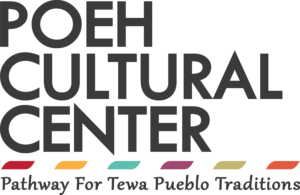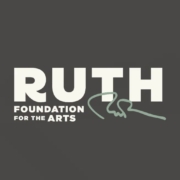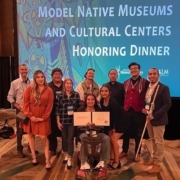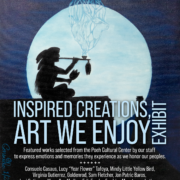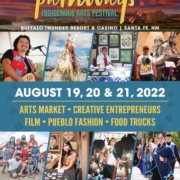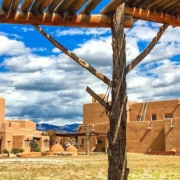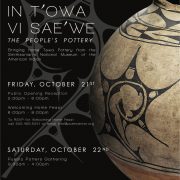The Poeh Cultural Center Receives A Grant from the Ruth Foundation for the Arts
Funding Will Be Used to Sustain Pueblo Arts Instructional Programs
PUEBLO OF POJOAQUE, NM – The Poeh Cultural Center (the Poeh) was awarded a $50,000 grant from the Ruth Foundation of the Arts (Ruth Arts) through its inaugural Core Grant program. This grant provides approximately $50,000 in funding to each of 84 nonprofit arts organizations – $4.5 million in total. The one-year program builds out the Foundation’s programmatic scope and geographic reach.
“We are proud to be a recipient of the Ruth Arts Foundation because of this shared vision to support artists in their communities,” said Karl Duncan, Executive Director of the Poeh Cultural Center. “Here at the Poeh, our traditional core values guide us in our programming and have led us to create free Pueblo Arts classes for the Native community and to establish community-based arts markets, such as the Pathways Indigenous Arts Festival, that feature many of our art students.”
“With these funds, traditional arts from the Pueblo People will continue to flourish into the next generation,” said Cris Velarde, Poeh’s Cultural Arts Specialist. “As an elder, we need to do everything we can to revitalize our culture because it is our identity as Tewa People.”
The Poeh Arts program was founded to help Native Americans, specifically the northern pueblo tribes and regional communities, preserve and promote the cultural arts of Northern New Mexico.
The grant adds to an already ongoing successful year of fundraising, as this is the second grant received from Ruth Arts. The first was received in the spring of 2022, obtained through a nomination process by Santa Clara Pueblo artist Rose B. Simpson.
“These programs are at once forward-facing and anchored in Ruth DeYoung Kohler II’s inimitable legacy,” says Executive Director Karen Patterson. “We’re proud to honor Ruth’s lifelong commitment to the arts by continuing to fund the organizations she personally supported and to develop new programs in her spirit of experimentation and community-building.”
These new grant programs, alongside the Artists Choice Grant announced earlier in 2022, total $12.75 million in grantmaking by Ruth Arts. Consideration for future grant cycles will continue on an invitation-only basis as Ruth Arts grows and develops. Additional programs currently under development will be announced in the coming year. For more information about the Foundation’s grants and programming, please visit rutharts.org.
ABOUT THE POEH
Founded in 1988, the Pueblo of Pojoaque established the Poeh Cultural Center as the first permanent tribally owned and operated mechanism for cultural preservation and revitalization within the Pueblo communities of the northern Rio Grande Valley. The Poeh has since become a resource for Pueblo people to learn the arts and culture of their ancestors. The facility resembles a traditional Pueblo village with its adjacent art studio buildings and outdoor gathering areas. The Center emphasizes the arts and cultures of all Pueblo People, focusing on the Tewa-speaking Pueblos of Pojoaque, San Ildefonso, Ohkay Owingeh, Santa Clara, Tesuque, and Nambé.
ABOUT THE RUTH FOUNDATION FOR THE ARTS
The Ruth Foundation for the Arts (Ruth Arts) is a new grantmaker based in the Midwest and dedicated to meeting the evolving needs and lived experiences of artists, communities, and arts organizations whose work is anchored by visual arts, performing arts, and arts education. Based in Milwaukee and national in scope, the Foundation reflects the culture and spirit of the Midwest, which long inspired its namesake and benefactor Ruth DeYoung Kohler II. Led by Executive Director Karen Patterson, as well as Program Directors Kim Nguyen and Rachel Reichert, the Foundation is a responsive and adventurous new force in the realm of arts philanthropy.
ABOUT RUTH DEYOUNG KOHLER II
A lifetime supporter of the arts, Ruth DeYoung Kohler II (1941-2020) was deeply committed to artists and consequently, broke down hierarchies and categories within the art world to center artists, support communities, and engage with overlooked art forms. She made significant contributions to the arts across the U.S., including serving as Chairman and member of the Wisconsin Arts Board, acting as a National Endowment for the Arts Visual Arts Organization panel member and past site evaluator, as founder of the Preservation Committee of Kohler Foundation, Inc., and Director of the John Michael Kohler Arts Center for more than forty years.
Among the many awards and honors Ruth received are the Governor’s Award for the Arts, Wisconsin; Visionary Award, American Craft Museum; Visionary Leadership Award, Center for Intuitive and Outsider Art; Visionary Lifetime Achievement Award, Museum of Art and Design; and honorary doctorates from various institutions of higher learning.
She believed passionately that the arts reveal who are as a people: past, present and future. She promoted equitable and inclusive access to the arts in her local community, her home state of Wisconsin, and on a national and international levels.
Source: Poeh Cultural Center and Ruth Foundation for the Arts
Media Contact: Cougar Vigil, Outreach Coordinator – cvigil@pojoaque.org
###
